Ontario's Chukuni River - Gateway to Woodland Caribou ParkThe Story of a Canoe Trip Through
Ontario's Woodland Caribou Provincial Park
|
| Go
to Chapter: 1 2 3 4 5 6 7 |
More Canoe Stories |
Park Information |
Maps for this trip |
Next Chapter |
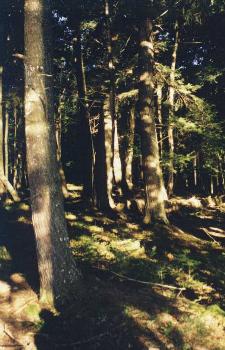 The canoe traveler remembered the first
time he followed no path, walking alone in the
woods. It was only a few years ago, in the forest
land of Michigan’s Upper Peninsula.
Carefully he packed his map, his compass,
water… He left a note in his tent – the
date, the time, where he intended to go. He even
kept a log of his walk, writing down each step-
"54 degrees, walk 8 minutes, 89 degrees walk
5 minutes…" The canoe traveler remembered the first
time he followed no path, walking alone in the
woods. It was only a few years ago, in the forest
land of Michigan’s Upper Peninsula.
Carefully he packed his map, his compass,
water… He left a note in his tent – the
date, the time, where he intended to go. He even
kept a log of his walk, writing down each step-
"54 degrees, walk 8 minutes, 89 degrees walk
5 minutes…"There was a pond deep in the forest. The small, sylvan lake was different from the waterways traveled by canoeists and fishermen. Broken trees stabbed out at odd angles from the stagnant black water. A rough steep bank encircled the pond, as if to close it off from the rest of the forest. He walked on and a ditch appeared, formed by some long gone cascade of water. He stumbled to the bottom and grabbed at branches as he climbed out. There were curious game trails that crossed the canoe traveler’s path, leading to some place that only the deer would understand. He was following one of these trails, breaking a branch here and there, placing two sticks together to mark his way. A downed tree appeared in front of him and he left the trail to walk around it. Ten seconds later, he was lost. The traveler stepped back around the tree, but the trail had disappeared. The log he stepped over just a few seconds ago, the one with the stick balanced on top – the one that marked his path – it too was gone. He knew where he was, he had his notebook, his compass, his map, but he was, for the moment, lost. A strange sensation crawled up the back of his neck. It made no sense, but he was afraid. For a minute he circled the tree again and again, but nothing was familiar, there was no mark to show where he came from. A few moments later, reason
pushed aside the fear. He sat down, studied his
log, then started to follow his bearings back to
camp. The ditch appeared, the pond… It
seemed silly, to be afraid when you had a
compass, a map, when so little intellect was
needed to find your way.
* * * Now the canoe traveler pushes aside alder branches as he walks the rocky, moss covered ground. It’s early in June and the brush is not yet thick. There’s no path at all, just rocks and downed trees and moss covered earth. Soon the lake shore is gone, his canoeing partner, his pack, his canoe – all of his connections to another world, all are somewhere behind him. He is alone, but his steps are confident, there is no fear. To his left is the high rock wall that leads him further and further into the woods. He follows the wall as it slowly sinks into the land, as it slowly loses its grand height. Deep in the forest, the rock wall becomes a small ledge. The canoe traveler steps up and begins to climb back toward the lakeshore.
He climbs. The wind blows harder now and
the canoe traveler moves carefully to the western
edge of the rock wall. The brush thins and he's
suddenly at an outcropping of rock. He sees his
partner below on a sandy beach, a tiny speck in
the endless landscape. Leaving the rock, he turns
inland and climbs still further, until he can
climb no more.
Our ancestors have been adding to the gift for thousands of years. They invented the compass, canoes, maps and ways to make them accurate. Others built roads that allow us to travel far from our urban homes. Satellites now encircle the earth,bringing quick communication and letting us know exactly where we are. Still others worked hard to keep this wild land now known as Woodland Caribou Park. The canoe traveler thinks these thoughts as he stands on the high shore. He thinks of those that will come after he is gone. Will they come to this high place? Will they open the gift? |
| Go
to Chapter: 1 2 3 4 5 6 7 |
More Canoe Stories |
Park Information |
Maps for this trip |
Next Chapter |
Copyright 2001 by James A. Hegyi http://www.canoestories.com/chukuni1.htm
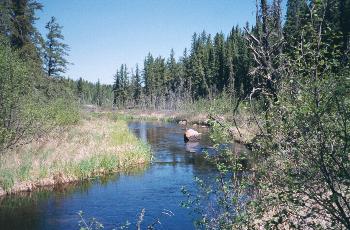
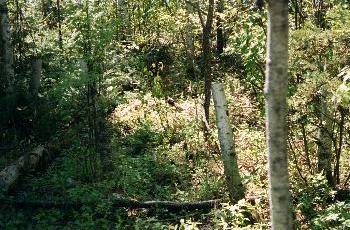 It
was silly, but there it was, a fear of being
lost. It was a small fear, but one that kept him
always near camp, that kept him close to the
trail, never stepping off the established path,
never really exploring the forest he loved to
visit.
It
was silly, but there it was, a fear of being
lost. It was a small fear, but one that kept him
always near camp, that kept him close to the
trail, never stepping off the established path,
never really exploring the forest he loved to
visit.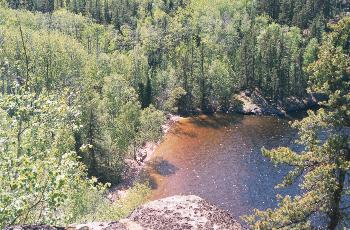 He
follows the wall, keeping near the edge, but not
too close. The land is dry here, and the moss
crunches beneath his feet as he picks his way
between bushes and stunted trees. It’s
quiet. There’s just a faint whispering of
the wind, a faint knocking of trees and creaking
of branches; small sounds, forest sounds. Already
he knows that this is a special place, a place
with a beginning and an end, a small island-like
place in a forest that stretches for hundreds of
kilometers in all directions.
He
follows the wall, keeping near the edge, but not
too close. The land is dry here, and the moss
crunches beneath his feet as he picks his way
between bushes and stunted trees. It’s
quiet. There’s just a faint whispering of
the wind, a faint knocking of trees and creaking
of branches; small sounds, forest sounds. Already
he knows that this is a special place, a place
with a beginning and an end, a small island-like
place in a forest that stretches for hundreds of
kilometers in all directions.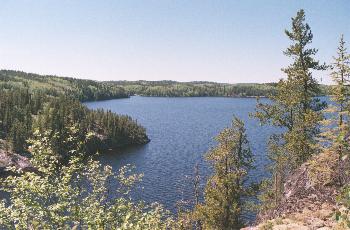 The
trees fall away as the immense hill of solid rock
sinks sharply into the waters of Bigshell Lake.
The lake stretches far to the horizon. The water
below is a deep blue, rippled by the wind,
sparkling here and there as the afternoon sun
catches a wave. Bands of lighter green birch
trees decorate the darker pine covered shores.
The
trees fall away as the immense hill of solid rock
sinks sharply into the waters of Bigshell Lake.
The lake stretches far to the horizon. The water
below is a deep blue, rippled by the wind,
sparkling here and there as the afternoon sun
catches a wave. Bands of lighter green birch
trees decorate the darker pine covered shores.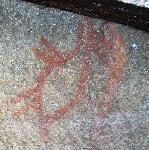 As he walks the high ground, he
searches for signs that others have been here
before. There’s no trace, but he’s sure
that many have walked where he now walks. The map
he holds tells him that there’s a pictograph
on a lake nearby, a small mark on a small rock
face. Symbols like the pictograph are found
throughout the world, carved or painted in lands
that were once wild, by people that lived by
their courage and skill, by their ability to
endure. The symbols speak to us from long ago:
"We were here, we lived in this land."
The canoe traveler imagines some other lone
figure standing where he now stands, looking out
at the land he now sees. Surely life was harder
then. Perhaps people were stronger, long ago; but
then, perhaps not. It seems more likely that we
forgot what we once knew about ourselves, about
our own toughness, our ability to endure.
As he walks the high ground, he
searches for signs that others have been here
before. There’s no trace, but he’s sure
that many have walked where he now walks. The map
he holds tells him that there’s a pictograph
on a lake nearby, a small mark on a small rock
face. Symbols like the pictograph are found
throughout the world, carved or painted in lands
that were once wild, by people that lived by
their courage and skill, by their ability to
endure. The symbols speak to us from long ago:
"We were here, we lived in this land."
The canoe traveler imagines some other lone
figure standing where he now stands, looking out
at the land he now sees. Surely life was harder
then. Perhaps people were stronger, long ago; but
then, perhaps not. It seems more likely that we
forgot what we once knew about ourselves, about
our own toughness, our ability to endure.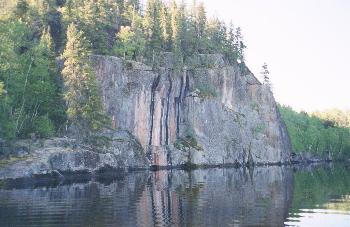 Our
History is a gift. Our history tells us what we
are capable of doing. We can paddle slowly from
lake to lake, portaging our canoes as people have
done for hundreds, or perhaps thousands of years.
We can endure the rain, the mosquitoes, the trees
and brush that block our way. We can walk into
the forest without fear, climb the rough, stone
hills and stand with the high wind.
Our
History is a gift. Our history tells us what we
are capable of doing. We can paddle slowly from
lake to lake, portaging our canoes as people have
done for hundreds, or perhaps thousands of years.
We can endure the rain, the mosquitoes, the trees
and brush that block our way. We can walk into
the forest without fear, climb the rough, stone
hills and stand with the high wind.